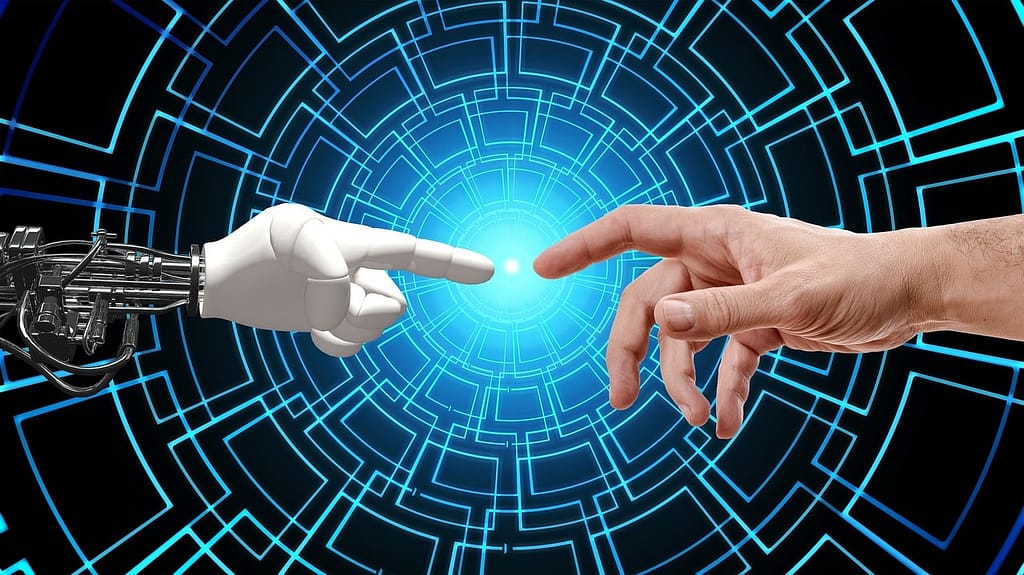The advent of artificial intelligence (AI) has revolutionized various aspects of our lives, from personal assistants like Siri and Alexa to complex algorithms driving autonomous vehicles.
One of the most significant impacts of AI, however, is its transformative effect on the job market.
This blog post explores how artificial intelligence is taking over jobs, addressing the implications, mechanisms, and future scenarios of this technological takeover.
Understanding Artificial Intelligence
How Artificial Intelligence Works
To grasp how artificial intelligence is taking over jobs, it’s crucial to understand how AI works. At its core, AI refers to the simulation of human intelligence in machines.
These systems are designed to perform tasks that typically require human intelligence, such as visual perception, speech recognition, decision-making, and language translation. AI works through algorithms and vast amounts of data, enabling machines to learn from patterns and make informed decisions.
The Mechanisms of AI Job Displacement
How Will AI Take Over Jobs
AI takes over jobs by automating tasks that were traditionally performed by humans. This process can occur in several ways:
- Automation of Routine Tasks: AI excels at handling repetitive and mundane tasks. For instance, in manufacturing, robots can perform assembly line work faster and more accurately than humans.
- Data Analysis: In sectors like finance and healthcare, AI systems analyze vast datasets to identify patterns and make predictions, roles that once required human analysts.
- Customer Service: Chatbots and virtual assistants provide customer support, handling inquiries and solving problems without human intervention.
- Decision-Making: AI systems can make complex decisions by evaluating large amounts of data. This capability is particularly valuable in industries like logistics, where AI can optimize supply chain operations.

Current Job Sectors Affected by AI
What Jobs Are AI Taking Over
AI’s impact on the job market is widespread, affecting various sectors:
- Manufacturing: Automation has significantly reduced the need for human labor in assembly lines and production processes.
- Retail: Self-checkout systems and inventory management robots are becoming commonplace, reducing the need for cashiers and stock clerks.
- Transportation: Autonomous vehicles and drones are beginning to replace drivers and delivery personnel.
- Healthcare: AI is used for diagnostic purposes, reducing the demand for certain medical professionals. For example, AI algorithms can analyze medical images more quickly and accurately than human radiologists.
- Finance: Automated trading systems and AI-driven financial analysis are taking over roles traditionally held by financial analysts and traders.
The Broader Implications of AI Job Displacement
What Will Happen When AI Takes Over Jobs
The widespread adoption of AI has significant implications for the job market and society as a whole:
- Job Losses and Economic Displacement: As AI systems become more capable, there is a growing concern about job losses. Workers in roles susceptible to automation face unemployment and the need for retraining.
- Job Transformation: While some jobs are eliminated, others are transformed. Employees may need to develop new skills to work alongside AI systems or manage and maintain these technologies.
- Creation of New Jobs: Historically, technological advancements have led to the creation of new industries and job categories. AI is likely to follow this pattern, generating new roles in AI development, maintenance, and oversight.
- Economic Inequality: The transition to an AI-driven economy could exacerbate economic inequality. Those with skills in AI and related fields may see increased job opportunities and wages, while others may struggle to find employment.

Future Scenarios: What If Artificial Intelligence Takes Over
What If Artificial Intelligence Takes Over
Speculating on the future, several scenarios emerge regarding AI’s takeover of jobs:
- Positive Scenario: In an ideal future, AI complements human workers, taking over mundane tasks and allowing people to focus on creative and strategic activities. This collaboration could lead to increased productivity and innovation.
- Negative Scenario: Alternatively, unchecked AI advancement could lead to massive unemployment and social unrest. If the benefits of AI are not equitably distributed, societal divisions could deepen.
- Balanced Scenario: A balanced approach involves proactive measures to manage the transition. This includes policies for retraining workers, creating safety nets, and ensuring that AI benefits all segments of society.
Addressing the Challenges
How Would Artificial Intelligence Take Over
To mitigate the adverse effects of AI on employment, several strategies can be implemented:
- Education and Training: Investing in education and vocational training is crucial. Programs that focus on AI literacy and skills development can help workers transition to new roles.
- Policy and Regulation: Governments can play a vital role by enacting policies that protect workers’ rights and promote equitable growth. This might include tax incentives for companies that invest in human-AI collaboration or regulations that ensure fair wages for all workers.
- Social Safety Nets: Strengthening social safety nets, such as unemployment benefits and health care, can support workers affected by AI-driven job displacement.
- Promoting Innovation: Encouraging innovation and entrepreneurship can create new industries and job opportunities, offsetting the jobs lost to AI.
Conclusion
Artificial Intelligence Taking Over Jobs Essay
The narrative of artificial intelligence taking over jobs is complex and multifaceted. While AI presents challenges in terms of job displacement and economic inequality, it also offers opportunities for innovation and increased productivity.
The key to navigating this transition lies in proactive measures that address the needs of displaced workers, promote equitable growth, and harness AI’s potential for societal benefit.
As we move forward, it is essential to strike a balance between technological advancement and human welfare, ensuring that AI serves as a tool for progress rather than a catalyst for division.
Discover more from KillCheap
Subscribe to get the latest posts sent to your email.



